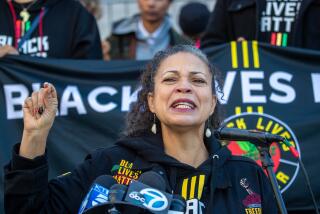L.A.-based dissident claims he was target of kidnapping attempt by Saudi Arabia

- Share via
A Saudi dissident living in Los Angeles said U.S. authorities granted him political asylum after he claimed that the Middle Eastern kingdom had attempted to extract him from the United States as a result of his criticism of the crown prince.
Abdulrahman Almutairi told The Times he was a student at the University of San Diego in late 2018 when his father and an unknown Saudi man arrived unannounced at Los Angeles International Airport, where U.S. authorities intercepted the two men and sent them home.
FBI agents told Almutairi what had happened at LAX and said they were investigating the matter, he said.
Akram Abusharar, an immigration attorney in Orange County, said he presented Almutairi’s story to the Los Angeles political asylum office, which he said concluded that the 27-year-old would probably be “killed, tortured or even disappear” if he were forced to return home. Almutairi was granted political asylum in July, said the lawyer, who took on the case pro bono.
Almutairi declined to provide documentation of his asylum to The Times, saying it contained private information that he didn’t want disclosed.
An FBI spokesperson declined to comment. An official with U.S. Citizenship and Immigration Services said the agency doesn’t comment on asylum cases “due to privacy protections.”
The FBI has contacted other Saudi dissidents in the United States about threats to their lives made by the kingdom, according to a report in the Middle East Eye. But Almutairi’s account, first reported by the Daily Beast, marks the first in which anyone has publicly claimed that the kingdom sent someone to the United States to bring a dissident back.
James Gelvin, a professor of Middle Eastern studies at UCLA, said Almutairi’s account is unlikely to affect U.S. and Saudi diplomatic relations under the Trump administration, which is closely aligned with the kingdom’s views on the region.
“The United States under Trump is locked into a perpetual alliance with Saudi Arabia, and nothing is going to change that,” Gelvin said.
Almutairi said his ordeal began shortly after the 2018 killing of Washington Post columnist Jamal Khashoggi, who was strangled and his body dismembered by Saudi agents in Riyadh’s consulate in Istanbul. The CIA concluded that the Saudi dissident was probably murdered on the orders of the kingdom’s powerful crown prince, Mohammed bin Salman, whom Khashoggi had criticized. The crown prince has denied ordering the killing.
Almutairi recorded a comedy video of himself speaking in Arabic about the killing, which mocked the crown prince’s denials as unbelievable and belittled the ruler using a child’s nickname. The YouTube video now has more than 1.2 million views.
Days later, Almutairi said, friends in Saudi Arabia told him his father was on a flight to Los Angeles to see him. Fearing a plot to kidnap him, Almutairi called the police, and within a few days met with FBI agents, he said. They showed him a picture of a man with a short beard who they said arrived at LAX with his father, and asked Almutairi if he knew him. He said he didn’t.
Almutairi said his criticism of the crown prince would have resulted in a prison sentence at best, and at worst execution. The kingdom, which had been paying for his healthcare and education and providing him with a stipend as an overseas student, cut him off. He was temporarily homeless, he said, and isolated from his family back in Saudi Arabia.
“My entire family has been destroyed,” Almutairi said.
Almutairi said he doesn’t see himself ever returning to Saudi Arabia. He said he plans to apply to USC’s film school, and hopes to make movies that bridge the cultural divide between the U.S. and his home country.
More to Read
Sign up for Essential California
The most important California stories and recommendations in your inbox every morning.
You may occasionally receive promotional content from the Los Angeles Times.











